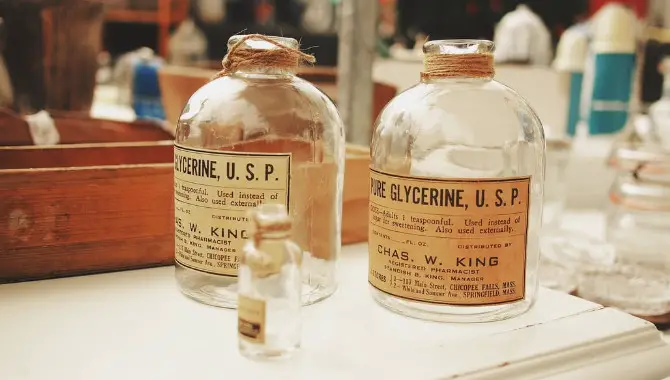People make the decision on why to become vegan for a range of different reasons, from moral concerns about the use of animals as a commodity, through to worries about how the meat and dairy industries are harming the environment. One thing that unites us all, however, is a shared desire to avoid animal products wherever it is both possible and practical to do so. Of course, this can be made more challenging by the widespread use of ingredients with unusual names, which are not immediately identifiable as vegan or non-vegan, with glycerin being one example.
So is glycerin vegan? Unfortunately, the answer is quite complex, as glycerin can be sourced from animal fats, vegetables, or a combination of the two. With many products, there is no indication of how the glycerin was sourced. When there is doubt, many vegans choose to stay away from it.
This can be a source of considerable frustration, because glycerin is used in a surprising number of different products, including food, cosmetics and medicine. You may even have been consuming it without knowing about the potential issues. In this article, I will cover the basics of what glycerin is, where it is used and why it can be both vegan or non-vegan. I will also outline possible ways you may be able to identify whether the glycerin in a product is vegan-friendly – when it is possible to do so – and also cover some similar ingredients to watch out for.
Is Glycerin Safe for Vegans to Consume?
Glycerin is a sweet-tasting, non-toxic liquid, which is widely used in a range of products, including food, cosmetics and pharmaceuticals. It has a number of different functions, which I will go into in the next section, but is safe to consume and is often praised for being ‘greener’ than many of the ingredients that could be used in its place. However, its widespread usage in both food and other consumer products is potentially problematic for vegans, because glycerin can be sourced from either animal or non-animal sources, and it can be difficult to know its origins.
With this in mind, it is important to first state that glycerin can be perfectly vegan-friendly and it will be in many cases. Certainly, its presence within a product does not automatically make it off-limits to vegans, but it is equally important that you do not automatically assume that glycerin is vegan-friendly either.
The two main sources of glycerin are vegetable fats and animal fats. For example, it is often sourced from soybeans, but can also be sourced from coconut oil, palm oil or other plant oils. All of these origins are in-keeping with the vegan lifestyle, although I should point out that some people have ethical concerns about the use of palm oil. In terms of animal fats, the main source of glycerin is tallow, which is a substance derived from beef or mutton. Clearly, glycerin sourced in this way would be off-limits to vegans. Synthetic glycerin also exists, but this is far less common.
For vegans, it should be a simple case of avoiding glycerin that is sourced from animal fats and only using products containing glycerin that is either sourced from plants or synthetically created in a lab. Yet, reality is more complicated because, in most cases, products containing glycerin will not specify where it was sourced from.
Therefore, to keep things simple, some strict vegans choose to avoid the ingredient entirely. Nonetheless, it is also worth pointing out that, when used in foods, most glycerin is sourced from vegetables. For this reason, some less strict vegans feel there is an acceptable level of risk involved and do not avoid it entirely. Its use within pharmaceuticals is also a factor that needs to be considered, especially when medication is a necessity.
While there is no obligation for manufacturers to list where glycerin was sourced, some manufacturers do choose to do so, in order to make clear that their products are vegan-friendly. If you see a reference to “vegetable glycerin”, for example, the product is completely safe for a vegan to consume. Another tip is to try to stick to products that have been certified as vegan-friendly as much as possible, as this will guarantee that the glycerin has been ethically sourced.
The main other option available to you is to contact the manufacturer directly. Some products include a helpline to call, which is ideal for when you need an answer quickly. Alternatively, if you have more time, you might instead visit their website to find contact information, or reach out to the customer service team via social media.
What is Glycerin Actually Used For?
In total, it is estimated that there are more than a 1,000 different uses for glycerin. It is one of the single most common ingredients found in cosmetics and is especially widely-used within hair and skincare products, including shaving creams, shower gels, soaps and shampoos, where it functions primarily as a moisturising ingredient. Additionally, you might see it contained within products like toothpaste, cough medicine and even e-cigarette liquid, helping to control moisture levels, or within anti-freeze products, where it can disrupt ice formation.
Moreover, glycerin is contained within a wide variety of foods and, in this context, it serves a number of different functions. Once again, it can help to maintain moisture, but it has additional qualities too, functioning as a thickening agent, or even as a sweetener. Examples of potentially vegan products where you might expect to see glycerin as a listed ingredient include cookies, bread and alcoholic drinks. It might also be listed under the name glycerol, or via its E number, which is E422. Monoglycerides, diglycerides and triglycerides are all derived from glycerin too.
One of the reasons glycerin is so widely used is because it is entirely non-toxic, both inside the body and outside. This means it is completely safe to eat, but also completely safe to dispose of, without requiring special methods to reduce its environmental impact. For this reason, it is often regarded as one of the most ‘green’ solvents around. The only potential side-effect to worry about is a mild laxative effect, which can occur with excessive consumption.
Finally, within the field of medicine, glycerin tends to be used in order to bind the active ingredients together more effectively. Its usage can also provide a smoother texture to tablets, making them easier to swallow.
Similar Ingredients To Be Aware Of
There are a number of other ingredients that vegans should be aware of, which follow similar principles to glycerin in terms of whether or not they can be classified as vegan-friendly. One of the biggest examples of this is xanthan gum, which is another common food additive. Much like glycerin, it can be used as a thickening agent, or a means of binding ingredients together. Usually, it is produced using a fermentation process involving simple sugars, making it vegan-friendly, but it can also be grown on the lactose in whey, which is a by product of cheese manufacture.
Meanwhile, lecithin has similar non-toxic qualities to glycerin and is also a popular food additive, which is widely used to improve the shelf life of products and to help bind ingredients together. It is also used within the pharmaceutical industry, primarily as a stabiliser, or as a means of adding or maintaining moisture. Given the similarities in uses between lecithin and glycerin, it may come as little surprise to learn that lecithin is also commonly derived from soybeans. However, what makes it problematic is that it can also be obtained from egg yolk.
With both xanthan gum and lecithin, vegan-friendly origins are more common than non-vegan origins. However, there is no foolproof way of knowing the source. Sometimes lecithin derived from soybeans will be specifically listed as soy lecithin, but this is not always the case. Therefore, you may need to follow the same basic practices as with glycerin: look for certified vegan products, or contact the manufacturer to ask whether or not their product is suitable. If you are still in any doubt, you may need to avoid the product or try to find an acceptable alternative.
Glycerin and Your Own Vegan Morality
Ultimately, the decision on whether or not to accept the use of glycerin within food and other products may depend on the factors that influenced your decision on why to become vegan in the first place.
For example, if you are a dietary vegan, who has been motivated by the potential health benefits of avoiding animal products, you may find the level of risk associated with glycerin to be acceptable. If you have been motivated primarily due to environmental concerns, it may be that the green credentials of glycerin make the risk acceptable. If you suffer from a certain medical condition that requires medication, and glycerin is used within the medication you need, it may be that accepting glycerin is a necessity and I would not wish to challenge you on these points.
However, the majority of vegans want to avoid the use of animal products wherever it is possible and practical to do so. Unfortunately, most manufacturers who make use of glycerin do not specify whether it was sourced from animal fats or vegetables and this makes it an ingredient that strict vegans will actively avoid. The exceptions to this would be if it is specifically listed as “vegetable glycerin”, or if the product itself is certified as being vegan-friendly.
A growing number of brands are taking care to specifically state whether or not their glycerin is vegan, while others will be happy to tell you if you contact them. Nevertheless, it is an area where an individual judgement call is required. If you do not have a medical condition and are trying to strictly avoid the use of animal products in all cases, I would suggest that the best approach is to stay away from glycerin if there is any doubt about its origins.
Welcome to VeganClue - My name is Robert Van De Ville and together with my team we spent hundreds of hours researching the most relevant topics for Vegans and non yet Vegans. Are you looking for more information about Veganism, animal welfare, diet, health, and environmental benefits of the Vegan lifestyle? You are in the right place! Enjoy the site.

